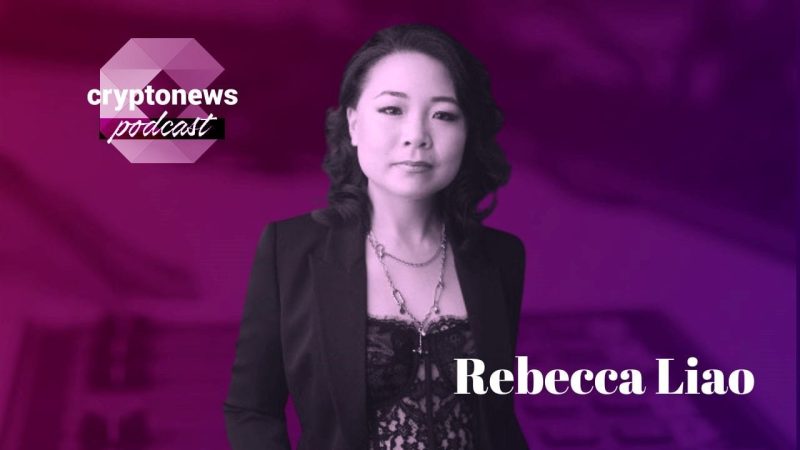Cryptonews Podcast host Matt Zahab sat for an exclusive interview with Rebecca Liao, CEO of Saga, a Layer-1 to launch Layer-1s.
Liao discussed the difference between the two main US parties in their approach to crypto and why people shouldn’t trust former president Donald Trump’s support.
She talked about what crypto needs to achieve to become relevant to the US government, why this tech can’t be banned, and how Saga contributes to the Web3 adoption.
Big Tech is in Bed with US Democratic Party
Liao is no stranger to the political game in the US. Though she is focused primarily on Saga, “you’re never quite out of the game,” she told us.
Having been involved in the Joe Biden and Hilary Clinton campaigns in the past, she is currently “helping out” on the Kamala Harris campaign as well, though she can’t share more about it at the moment.
Interestingly, she says, it’s like there are two Rebeccas, depending on who is looking.
Most crypto natives see her as the co-founder of Saga, but those in politics know her “primarily as a foreign policy wonk.”
In addition to foreign policy work, she is also active in the national security policy sector, especially the intersection of defense and the technology industry.
But the politicians know that “the two worlds are starting to meld.”
Having said all that, with policymakers, it’s a scratch-the-itch situation, she said. They search for that which most people need.
“And I hate to break it to the crypto crowd, but for most people in the world, foreign policy is still more top of mind than, say, straight crypto issues,” she said.
Furthermore, Vice President Harris and most people who would be serving in a potential administration are no strangers to tech. Harris grew up in the tech scene and is supportive of it.
“Big tech has been in bed with the Democratic Party for a very long time.”Liao continued. “The DNC likes to pry itself as very cosmopolitan, progressive, and forward-thinking. And so the tech angle is your most fruitful angle.”
Therefore, she can help advise the party and potential administration in both the foreign policy and the crypto/tech spheres.
“I think that there’s definitely a play that crypto can make here,” she noted.
Once You Have Users, You Have Voters, You Have Government
Many people believe that the Democrats are persecuting crypto, Liao opined.
Even if that were true, banning a necessary product is not easy. TikTok is an excellent example, she said.
Despite regulatory scrutiny and bans, even politicians will run to use an app if it provides value “because it has critical mass in terms of adoption.”
And that’s what the crypto industry needs, Liao argued.
“That’s what we need to focus on, getting users in here. Because once you have the users, you have the voters. Once you have the voters, you have government.”One of the things she has always insisted upon at Saga is to have broader cultural resonance. This is necessary for Web3 to “really make it” and get to the mainstream audience.
Four demographics are key: millennials, Gen Z, women, and minorities.
They are the bedrock of the Democratic Party and will vote for the advancement of the industry as well.
However, once a product gains a broad-based appeal, “it doesn’t matter whether you’re a Republican or Democrat. You’re going to use products from these brands anyway. You’re going to give a lot of credibility to these brands,” said Liao.
Crypto is crypto. It’s not tied to the Republican Party. We need to remember this, she noted, as there has been “a little too much emphasis on tribalism within crypto.”
Remember Why Politicians Say What They Say: Follow the Money
Related to the previous discussion is the massive crypto-narrative difference between the Kamala Harris and Donald Trump presidential campaigns.
But the reason may not be why one would think.
Let’s look at the Harris campaign first.
They have made a few statements saying that the Vice President is more than happy to sit down with crypto leaders to understand how better to service the industry and ensure that America is ultimately on top.
But the problem for the crypto folk is that her messaging does not go as far as the Trump campaign’s.
Additionally, Harris is not personally close to many in the crypto world, so there’s a difference in the level of engagement.
Given this, many in the crypto world argue that the Republicans are genuine about the messaging, whereas the Democrats just don’t want to be iced out from the crypto vote.
Now let’s look at the Trump campaign.
The Republicans have identified that, despite the current state of the crypto market – there is still money in crypto to be taken.
And crypto contributions have been very helpful to the Trump campaign.
“Fundraising has been a struggle for the Trump campaign for this entire election cycle, whereas for the Democrats, no such struggles.”Therefore, the Democrats are not looking to crypto as a revenue source, but as a niche tech matter with passionate supporters.
Hence, as is the case with many things, “you follow the money,” Liao concluded.
Scaling With as Many L1s as Needed
Discussing Saga, Liao explained that it is a Layer-1 to launch Layer-1s.
It allows developers to automatically get onto their own dedicated block space, called chainlets. These speak to each other.
The system is interoperable both within its own ecosystem and with other ecosystems. No fees are charged.
It infinitely scales, and developers can have as many Layer-1s supporting their application as needed.
With research, it became obvious to the team that, for proper scaling, people need as many L1s as possible – not rollups, app chains, or side chains.
Moreover, Saga came out with its DeFi layer: the liquidity integration layer (LIL). The company takes a cut of liquidity as opposed to charging gas. “So we have an entirely new way of generating revenue for the protocol,” said Liao.
Furthermore, as any game needs a publisher, they established their own publishing house, Saga Origins.
The team is highly focused on consumer applications, particularly in gaming and entertainment.
Saga has about 380 projects building on its platform. 80% of that is gaming, and that is by design.
The company recently revealed its three flagship titles: Angelic: The Chaos Theatre, Lussa: The Final Frontier, and God’s Legacy.
And there will be even bigger game reveals this fall/winter and a lot of exciting titles heading into 2025.
“We are moving Web3 Gaming into a completely new direction, and it’s happening at a time when gaming itself is also in a moment of transition.”Additionally, LIL will be implemented over the next two to three months.
Finally, the ecosystem welcomes the arrival of DeFi.
“In terms of how we are completely changing, how a protocol ultimately generates revenue from activity on the chain, that’s going to come out very shortly,” Liao said. “It is a completely new way in which we solve liquidity fragmentation.”
____
That’s not all.
Liao also discussed:
game publisher Saga Origins and DeFi layer LIL; creating infrastructure for the gaming and entertainment industries from the beginning: different aspects of how influencers and content creators ultimately play within the gaming industry; what gamers and viewers seek from the content, and why designated Web3 streaming platforms are not currently needed; serving in Joe Biden’s and Hillary Clinton’s presidential campaigns; two kinds of US presidential campaigns and the current Kamala Harris campaign; forming the best narrative for politicians to adopt crypto.You can watch the full podcast episode here.
__________
About Rebecca Liao
Rebecca Liao is the CEO of Saga and an advisor to Sommelier Protocol, where she is designing their DAO.
She is also the co-founder, advisor, and former COO of Skuchain, a currency-agnostic blockchain for global trade.
Before Skuchain, she was director of business development and head of Asia for Globality, a Softbank-backed B2B unicorn for AI-powered procurement of professional services.
Liao was a member of US President Joe Biden’s 2020 presidential campaign, where she helped advise on China, technology, and Asia economic policy.
She also served on Secretary Hillary Clinton’s foreign policy team for her 2016 presidential campaign, where she was responsible for Asia trade and economic policy.
Liao writes for the New York Times, Financial Times, Foreign Affairs, The Atlantic, Bloomberg View, and other publications. She is a fellow at the Stanford Program in Law, Science, and Technology, where she focuses on tech policy.
The post Rebecca Liao, CEO of Saga, on Harris vs Trump (Crypto) Campaigns and Launching an L1 for L1s | Ep. 367 appeared first on Cryptonews.


